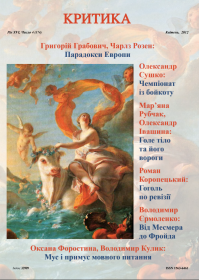Mesmer and Freud: On Medicine Becoming a Philosophy In Krytyka, No. 4 (174), 2012, pp. 30-31.
Keywords:
Hypnosis, Freudianism, psychoanalysisSynopsis
In this article, the author reflects on the relationship between mesmerism and Freudianism, analyzing the scale of cultural transformations generated by these intellectual trends. He presents magnetic theory not only as a medical phenomenon, but also as a factor that significantly influenced the development of philosophical and literary thought. The author emphasizes that the dialectical tradition of 19th-century German philosophy and Romanticism in general reproduced the logic of attraction and repulsion inherent in the magnetic way of thinking.
Mesmerism, according to his interpretation, was both a symptom and an expression of the 19th century, while Freudianism reflects the spiritual climate of the 20th century. For mesmerism, the decisive idea was the union of the individual self with the collective whole, while Freudianism emphasized the relativity of human desires and the variability of their objects. Within the mesmerist paradigm, the object of love was the center of attraction of desire; in the Freudian approach, it is rather seen as a target of projections, where the specific properties or shortcomings of the object are of secondary importance.
Downloads




